
Choosing the right prompt library platform can save your business time, money, and effort. Here's a quick breakdown of the top five options for managing and optimizing AI prompts, based on their features, pricing, and ideal use cases:
| Platform | Key Features | Pricing | Best For |
|---|---|---|---|
| God of Prompt | 30,000+ prompts, lifetime access | $27-$150 (one-time) | Small businesses needing prompts |
| Prompts.ai | Optimization, collaboration, analytics | Subscription-based | Teams focused on quality outputs |
| PromptLayer | Logging, version control, analytics | $50/user/month | Large, technical teams |
| Helicone | Monitoring, caching, A/B testing | $20/user/month | Technical users |
| PromptPerfect | Real-time optimization, multi-model | $19.99-$99.99/month | Businesses refining AI workflows |
Pick the platform that aligns with your team's needs, budget, and technical expertise. Each option offers distinct strengths for different business goals.
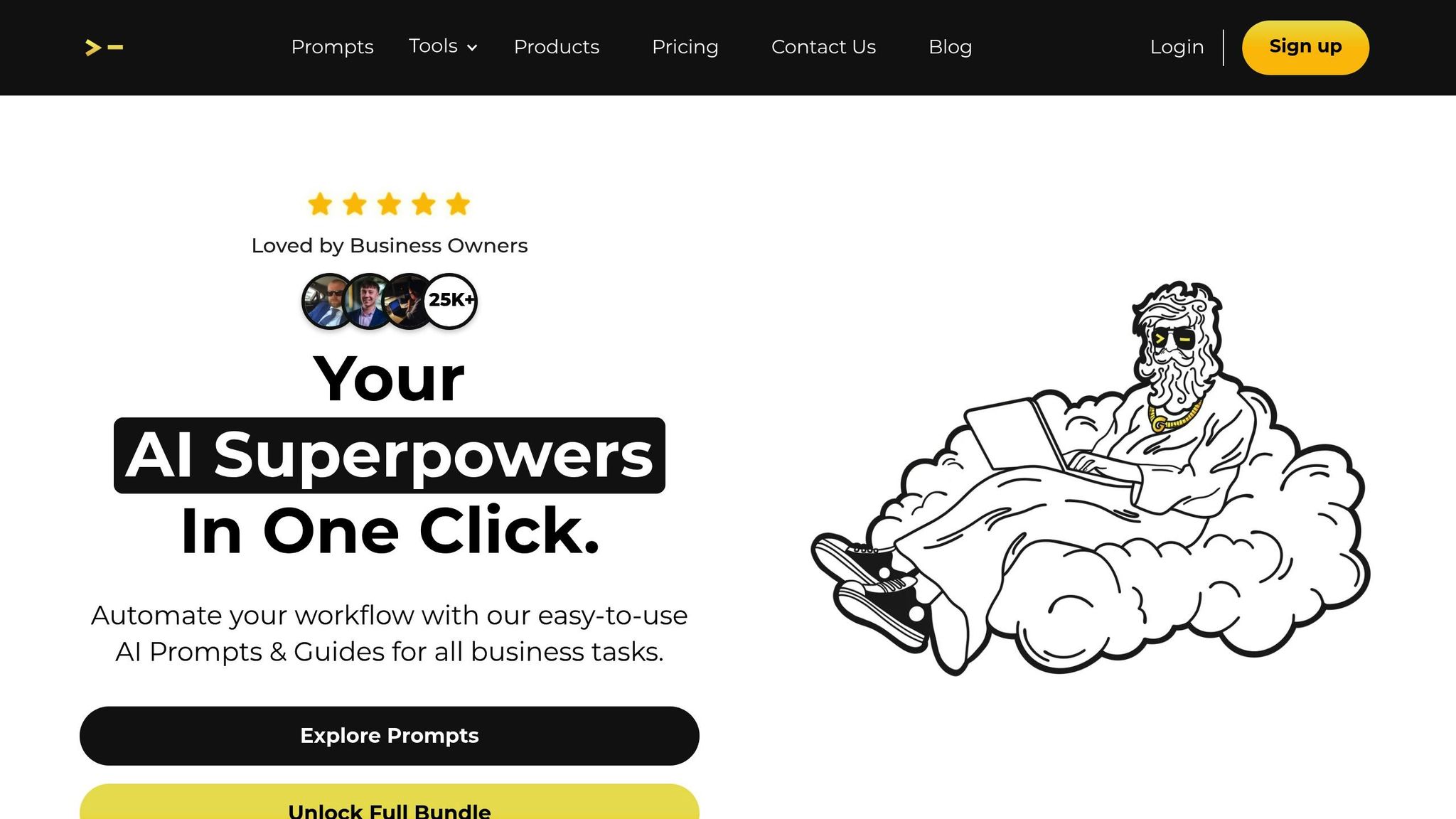
God of Prompt provides lifetime access with a single purchase, making it an attractive option for cost-conscious businesses.
The platform offers a massive library of over 30,000 AI prompts, neatly categorized by business functions like marketing, sales, finance, e-commerce, and productivity. Using "mega-prompts" - detailed, layered instructions - it generates highly personalized outputs, streamlining even the most complex tasks.
Pricing is straightforward: individual packs cost between $27 and $37, while the Complete AI Bundle is available for $150. This eliminates recurring fees, offering a budget-friendly solution with long-term benefits.
Here’s a glimpse at some of the offerings:
Once purchased, you get unlimited access, enabling teams to scale without incurring extra costs.
All prompts are delivered via Notion, ensuring seamless integration into existing workflows. Teams can easily copy, customize, and share prompts across departments, enhancing collaboration and efficiency.
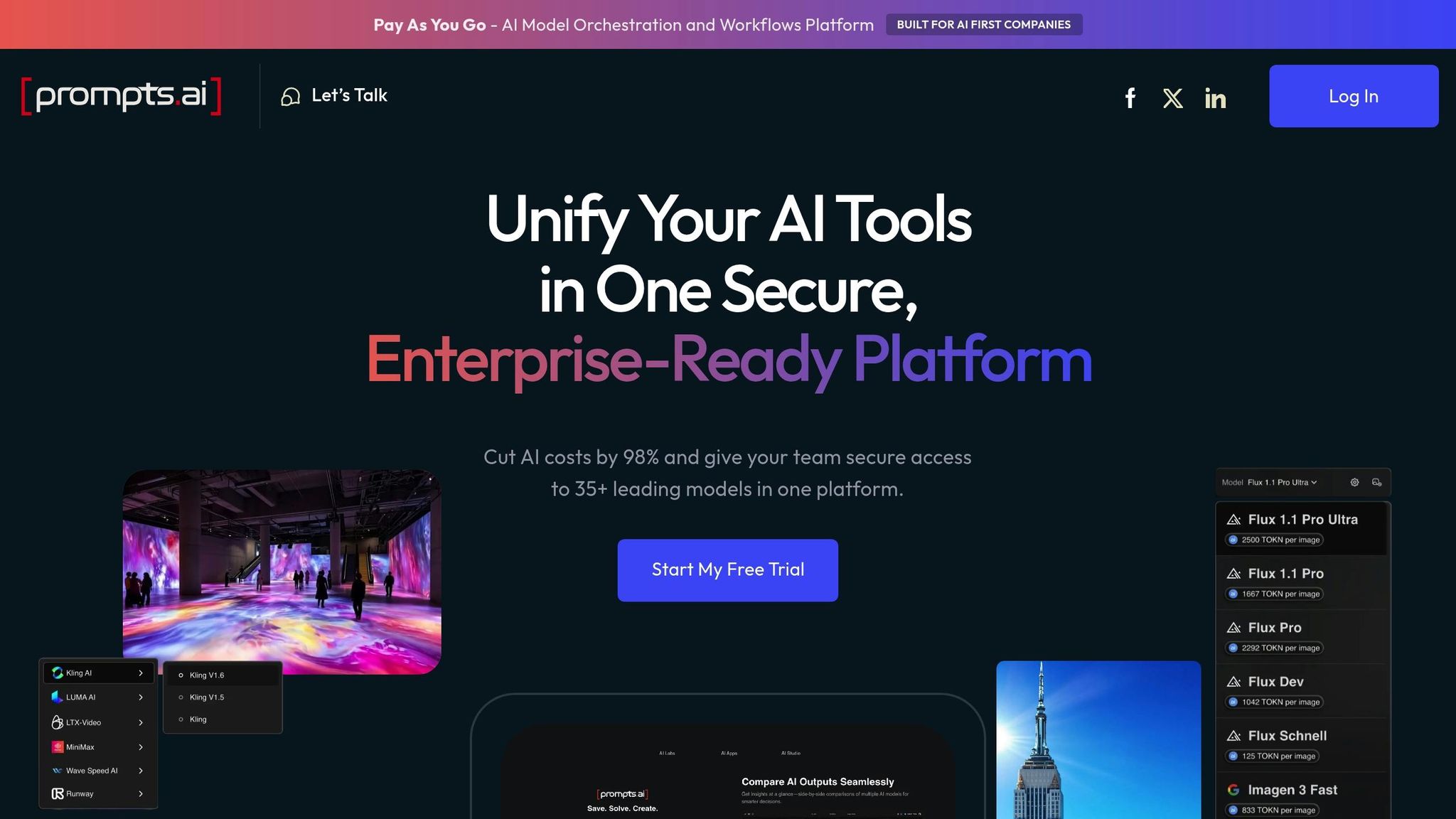
Prompts.ai runs on a subscription model with tiered pricing, tailored to meet various business needs. At its core is an AI-powered prompt optimization engine that refines prompts using performance data. This helps businesses improve the quality of their AI-generated outputs over time.
The platform organizes its content library around industry-specific workflows, ensuring prompts are aligned with the standards and requirements of different sectors. Collaboration is made easy with shared workspaces, where team members can contribute, edit, and manage prompt versions. This feature is particularly useful for maintaining consistency across teams and departments.
Prompts.ai also integrates seamlessly with popular business applications through API connections, enabling teams to access and deploy prompts directly within their existing workflows. An analytics dashboard provides detailed insights into prompt usage and team performance, helping organizations fine-tune their AI strategies.
Additionally, the platform includes a guided prompt builder to create effective prompts for a variety of business scenarios. For enterprises, white-label integration is available as part of their custom packages.
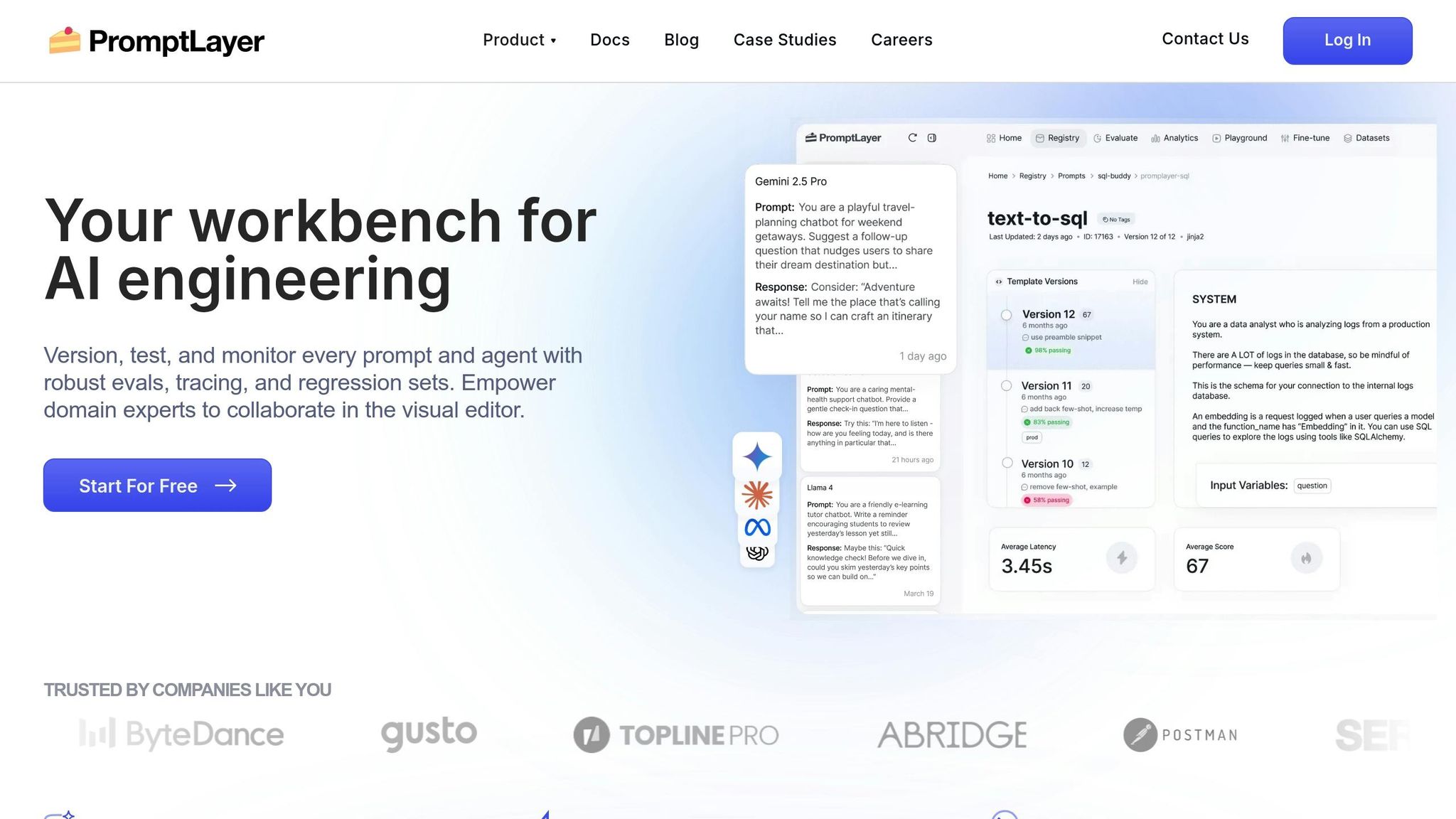
PromptLayer offers a freemium pricing model that scales based on usage, making it suitable for businesses of all sizes. Acting as middleware between your applications and AI models, it provides robust tools for logging, monitoring, and managing prompt interactions. This setup lays the groundwork for more detailed analytics in its features.
One of its standout features is granular logging and analytics. Each prompt request is logged along with metadata like response times, token usage, and model performance. This data helps identify areas for optimization, ensuring your AI processes run efficiently.
PromptLayer also includes a version control system for managing prompts. Teams can create, test, and deploy different prompt versions while maintaining a detailed history of all changes. This makes it easy to roll back to previous versions or compare performance across iterations, reducing the risk of deploying underperforming prompts in live environments.
Integration is straightforward with lightweight SDKs that support popular programming languages like Python and JavaScript. These SDKs allow you to capture prompt data with minimal effort, making it easier to improve workflows and foster collaboration.
A shared dashboard enhances teamwork by enabling prompt reviews, comments, and updates. Quality assurance teams can flag issues with outputs, while developers can quickly spot trends in failed requests. This helps ensure consistency across various AI-driven processes within a company.
For enterprise users, PromptLayer provides advanced features like custom data retention, enhanced security, dedicated support, bulk data export, and custom reporting that can integrate with existing business intelligence tools.
Lastly, real-time monitoring keeps your team informed of performance dips or unusual activity. Alerts allow teams to address problems quickly, ensuring service quality and minimizing disruptions for end users.
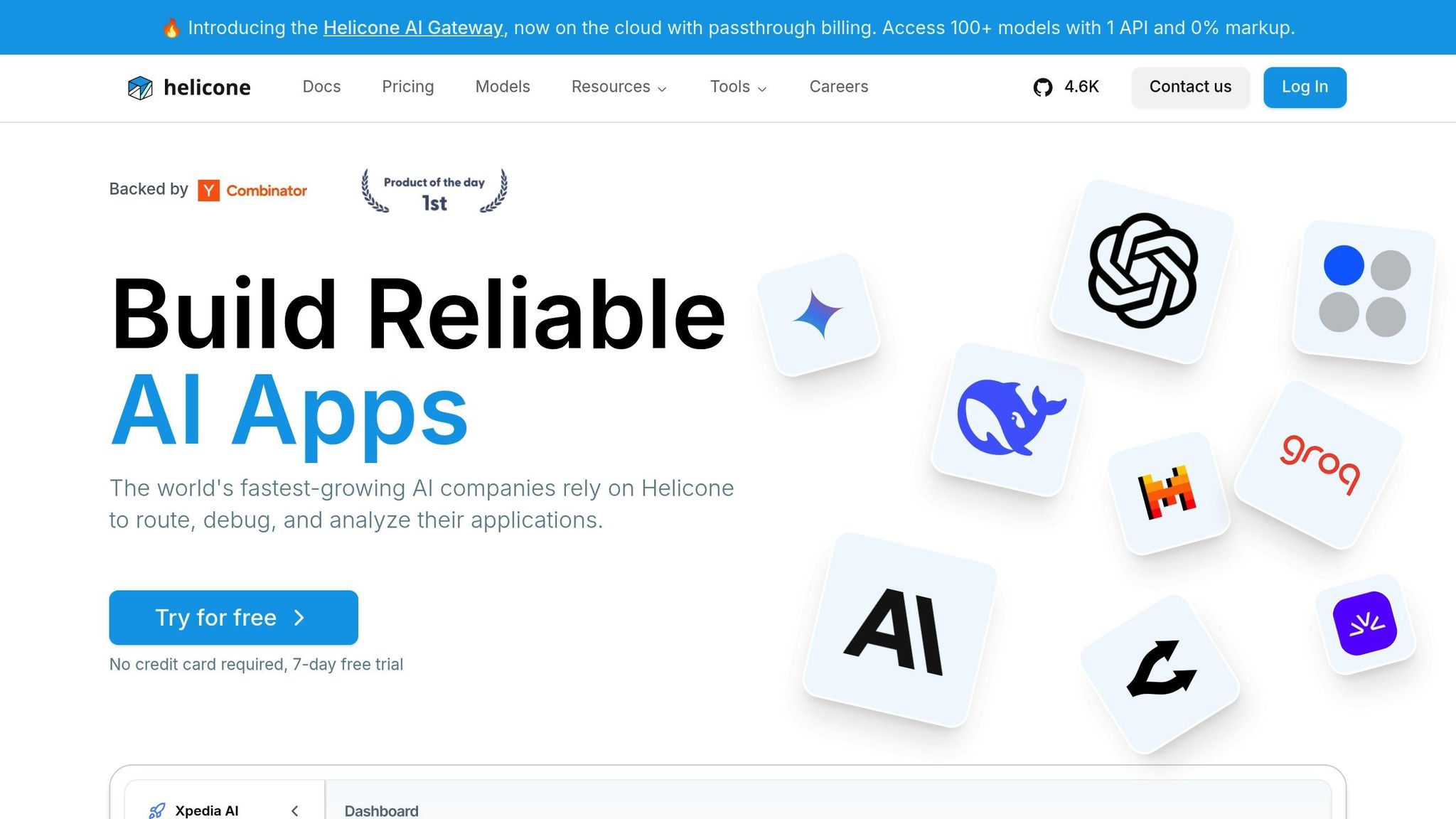
Helicone serves as an observability platform tailored for AI applications, offering tools to monitor and log API requests for better system transparency. With its ability to track requests in detail and apply custom tags, it simplifies prompt data analysis. Its caching feature is particularly handy, helping to improve performance when handling repetitive queries.
The platform also supports rate limiting and load balancing, ensuring that services remain stable even during high-demand periods. Real-time alerts and monitoring help teams quickly identify and address issues before they escalate, keeping user experience intact. Plus, its built-in A/B testing functionality allows teams to experiment with different prompt versions, refining outputs for better results.
Integrating Helicone into existing workflows is straightforward thanks to its simple SDKs, making it easier to gather insights and improve performance without disrupting ongoing processes.
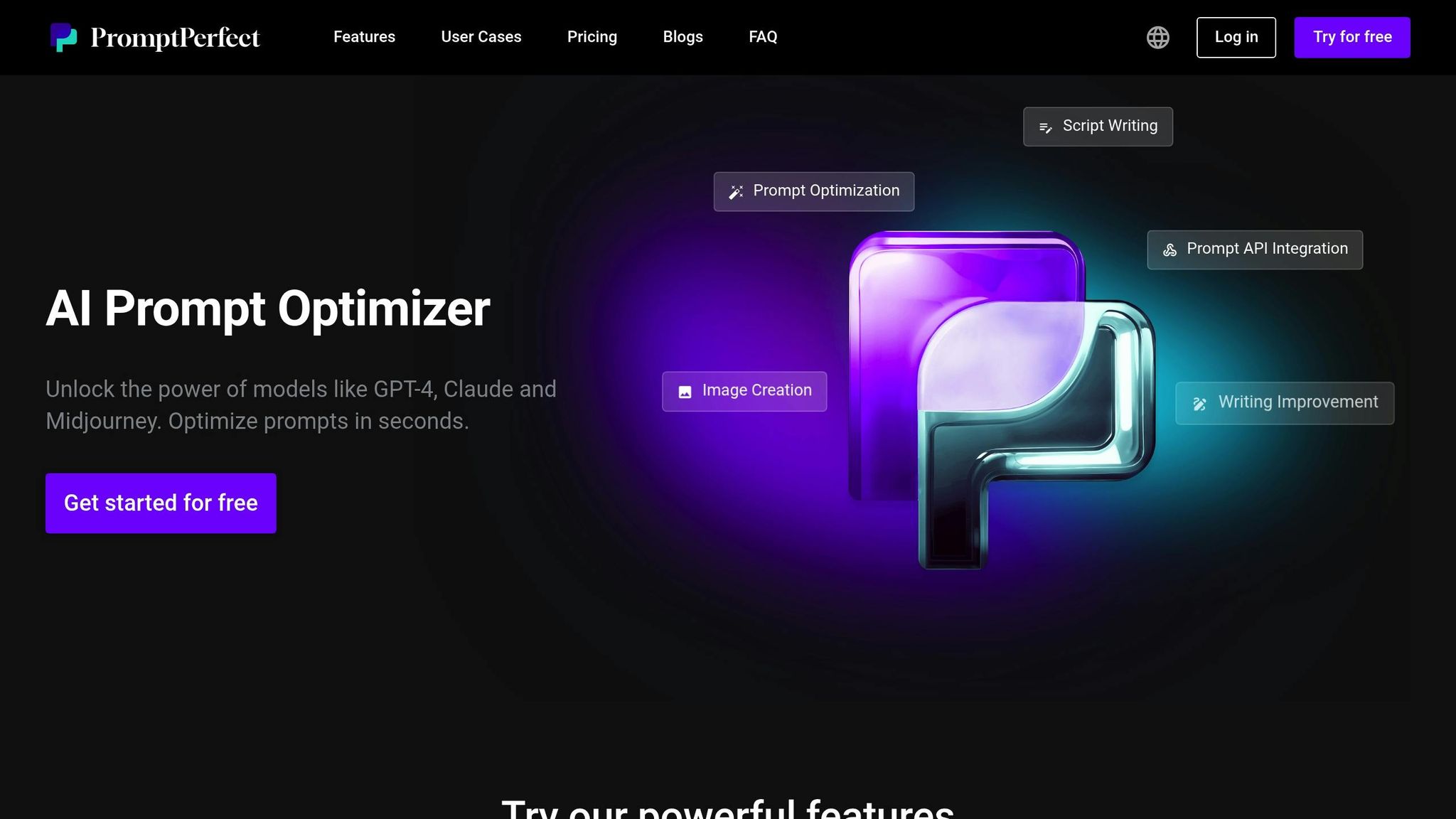
PromptPerfect takes the guesswork out of crafting effective prompts for large language models by offering a science-backed approach to optimization. It provides real-time suggestions, helping users refine prompts effortlessly and improve the quality of AI-generated outputs.
At the core of the platform is its Auto-tune feature. All users need to do is input their initial prompt, adjust settings like maximum length and iteration count, and let PromptPerfect generate an optimized version designed to deliver better accuracy and relevance.
What truly makes PromptPerfect stand out is its multi-model support. It works seamlessly with a variety of AI models, including GPT-4, Claude, Llama, Stable Diffusion, and Midjourney. This flexibility allows businesses to test and compare performance across different models without switching platforms. The Arena feature simplifies this process by enabling teams to test the same prompt across multiple systems to find the best fit for their needs.
For businesses looking to embed AI optimization into their workflows, PromptPerfect offers Prompt as a Service. This feature lets companies deploy optimized prompts through API services, making it easy to integrate directly into their tools and processes. By doing so, it supports various departmental needs, making AI workflows more efficient.
PromptPerfect caters to a wide range of users:
The platform also adds convenience with a browser extension, allowing users to optimize prompts directly in tools like ChatGPT. Additionally, its version history and analytics features help businesses track prompt performance over time.
Pricing is designed to accommodate various needs. The free Standard plan includes 10 requests per day, while the Pro plan at $19.99/month offers 500 daily requests for Auto-tune and Arena testing. For larger demands, the Pro Max plan at $99.99/month includes API access, 1,500 daily Auto-tune requests, and 1,000 daily Prompt as a Service requests. Custom enterprise pricing is also available for tailored solutions.
To serve a global audience, PromptPerfect supports multilingual optimization, making it easy to enhance prompts in multiple languages. For teams managing large-scale AI projects, batch optimization tools simplify handling multiple prompts at once.
As the PromptPerfect FAQ explains:
"PromptPerfect offers a streamlined and interactive way to optimize prompts for use with large language models. With features such as automatic prompt enrichment and customizable settings, PromptPerfect can help make prompt engineering more manageable and scientific, resulting in higher-quality and more relevant output generated by the models." – PromptPerfect FAQ
While the platform excels in automating prompt refinement and supporting various AI models, the free plan's limited usage and the learning curve for beginners may pose challenges.
When it comes to features, pricing, scalability, and integration, these platforms reveal distinct patterns. After diving into detailed reviews, here’s a closer look at their standout qualities and areas that might need improvement.
God of Prompt boasts a massive library of over 30,000 AI prompts, lifetime updates, and seamless integration with Notion. Its wide-ranging collection spans industries like marketing, finance, and e-commerce, making it a practical choice for businesses in need of ready-to-use prompt solutions. However, it lacks built-in analytics, which could be a drawback for teams that prioritize data-driven insights.
PromptLayer is designed with enterprise-grade features, offering visual versioning (no coding required), detailed analytics for usage and latency, and collaboration tools that connect technical and non-technical teams. With robust API integrations and a premium price tag of $50 per user per month, it’s best suited for teams with advanced technical needs and the budget to match.
Helicone provides a more budget-friendly option, starting at $20 per user per month for its Pro plan and $200 per month for its Team plan. It shines in real-time monitoring and performance optimization, helping businesses track how well their AI tools are working and identify potential bottlenecks. However, its interface leans heavily toward technical users, which might be a hurdle for those without a development background.
PromptLayer and Helicone both deliver scalable solutions with flexible pricing for larger deployments and custom enterprise plans. God of Prompt, on the other hand, scales by offering a vast library of prompts that support various business functions, although it doesn’t include specialized monitoring tools.
For businesses with strict compliance and governance needs, PromptLayer stands out with features like comprehensive audit trails and version control. Helicone also offers strong monitoring capabilities, while God of Prompt focuses on providing accessible resources and practical guides.
| Platform | Key Strengths | Primary Weaknesses | Best For |
|---|---|---|---|
| God of Prompt | 30,000+ AI prompts, lifetime updates, seamless Notion integration, broad resource library | Lacks analytics | Small to medium businesses needing a prompt repository |
| PromptLayer | Visual versioning (no coding), detailed analytics, robust collaboration tools, strong API integration | High cost at $50/user/month | Teams with technical expertise and larger budgets |
| Helicone | Affordable pricing, real-time monitoring, performance optimization, strong integration | Technical interface less intuitive for non-developers | Mid-sized companies focused on performance tracking |
Each platform offers unique strengths tailored to different needs, whether it’s technical expertise, budget considerations, or specific workflow requirements.
Your choice should align with your business size, technical know-how, and budget. Picking the right plan can simplify your processes and make the most of your AI investment.
For Small to Medium Businesses:
The Complete AI Bundle is a solid option. It offers lifetime access to the bundles mentioned earlier, along with updates, ensuring seamless integration across various departments without added risk.
For Budget-Conscious Businesses:
Start with the free plan. It includes over 1,000 ChatGPT prompts and 100+ Midjourney prompts, giving you a strong starting point. As your needs grow, you can upgrade to specific bundles that suit your operations. If budget isn’t your only concern, focus on tools that best fit your workflow.
For Specialized AI Needs:
If you’re looking for something more targeted, go for specific bundles. For instance, the Midjourney Bundle is great for visual content, while the ChatGPT Bundle excels in text-based tasks. This way, you can balance cost with performance effectively.
Choose a plan that fits your team’s current needs and adjust as your use of AI evolves.
When choosing between a one-time payment platform like God of Prompt and a subscription-based service, small businesses need to carefully consider their budget, usage patterns, and long-term objectives.
A lifetime access option comes with a single upfront payment, which can be great for businesses looking to save costs over time and plan for consistent use. On the flip side, subscription models break costs into recurring payments and often come with ongoing updates and customer support. If your business requires only occasional access, lifetime access could be the more cost-effective choice. However, for frequent or heavy use, a subscription might make more sense.
It’s also important to think about flexibility and future growth. Subscription services often provide more adaptability and advanced features as your needs evolve, while lifetime access platforms like God of Prompt focus on delivering enduring value without the commitment of ongoing fees.
Features like version control and real-time monitoring are essential for streamlining AI prompt management, especially for technical teams. With version control, teams can keep track of changes, compare updates, and roll back to earlier versions if needed. This creates a more structured and efficient workflow, which is particularly helpful when testing and fine-tuning prompts over time.
On the other hand, real-time monitoring offers immediate insights into how prompts interact with large language models (LLMs). It helps teams spot performance issues, like execution bottlenecks, right as they occur. By combining these tools, teams can ensure their prompts remain effective, collaborate seamlessly, and tackle challenges as they arise - making these features critical for managing AI-driven projects.
Multi-model support in PromptPerfect allows businesses to fine-tune AI outputs by adjusting prompts to suit the specific needs of different large language models. This approach ensures that each model performs at its best, no matter its strengths or limitations.
By customizing prompts for various AI systems, businesses can maintain consistent and reliable results across multiple platforms. This is especially useful for companies using a mix of AI tools to tackle a wide range of challenges.





